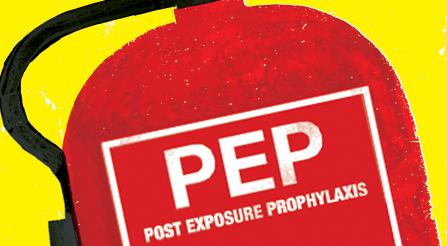 Post Exposure Prophylaxis after Sexual Exposure to HIV (or PEPSE) can help reduce the risk of catching HIV.
Post Exposure Prophylaxis after Sexual Exposure to HIV (or PEPSE) can help reduce the risk of catching HIV.
Condoms are the best way of stopping HIV: they can be free (from your doctor or sexual health clinic), are easy to find, have no side effects, only need to be used during sex, and don’t require medical help.
However there’s a thing called PEPSE (or, sometimes, just PEP) which can stop a person becoming infected after HIV has entered their body:
What is PEPSE?
[peekaboo name=”whatispepse”]
[peekaboo_content name=”whatispepse”]
PEPSE is a 28-day course of HIV drugs that someone takes after sex where there may have been a risk of HIV transmission.
The sooner PEPSE is started, the more likely it is to work; within 24 hours is best, but no later than 72 hours (three days). After 72 hours PEPSE is unlikely to work.
[/peekaboo_content]
Getting PEPSE
[peekaboo name=”gettingpepse”]
[peekaboo_content name=”gettingpepse”]
PEPSE is available free on the NHS but it is only given to people who meet national guidelines about its use. These guidelines help doctors decide who might be offered PEPSE and in which circumstances.
PEPSE involves powerful and expensive drugs that have side effects. To make sure it isn’t given to people with no real risk of infection, if you want PEPSE you will be asked questions about:
- the person you had sex with (and the chances that person had HIV)
- what kind of sex happened (vaginal, oral, anal)
- and if the other person definitely had HIV, what was their ‘viral load’ (if this is known)?
The best place to go for PEPSE is a sexual health (GUM) clinic or an HIV clinic. These are usually open only during the week and only during office hours. If you need PEPSE outside these times, the best place to go is the Accident and Emergency (A&E) department of a hospital. PEPSE is not usually available from GPs (family doctors).
Once a doctor has considered your risk, a decision will be made about whether PEPSE is appropriate. If so, you must first have an HIV test. This makes sure that you don’t already have HIV; if you do, taking PEPSE is not the right treatment you need.
[/peekaboo_content]
Taking PEPSE
[peekaboo name=”takingpepse”]
[peekaboo_content name=”takingpepse”]
If a dose is missed take the next dose as soon as you remember – don’t take double the dose.
It is not uncommon for people taking PEPSE to get side effects. These will stop once the course of drugs has been completed but for some people they can make sticking with PEPSE difficult. Headaches, tiredness, feeling sick and diarrhoea are common side effects.
If you are finding the treatment difficult, speak to the clinic that gave it to you; they can give you medication to help with side effects. Because of side effects some people need to take time off work or study while they are on PEPSE. Also, as recreational drugs can have dangerous interactions with HIV medication, it’s advisable to not use them while taking PEPSE.
To ensure that the PEPSE drugs have not had any negative impact on your body, you will need blood tests within two weeks of starting the treatment and at the end of the course. To be sure that no HIV infection has taken place, three months after the course of PEPSE drugs has been completed an HIV test is carried out. If you decide not to take PEPSE, an HIV test is recommended anyway, along with a check up for sexually transmitted infections.
Patients are advised not to have unprotected sex until their final HIV result is known to be negative.
[/peekaboo_content]
PEPSE is an emergency measure to be used as a last resort, eg, if a condom breaks or you have a ‘slip up’ from your usual safer sex routine. PEPSE is a combination of powerful drugs and can be hard to get hold of, so it is no substitute for condoms, but it’s important to know about in case one day you or someone you’ve had sex with needs it.
PEPSE is not guaranteed to always work but has a high success rate. It is free of charge but can only be prescribed by doctors and if certain criteria are met. Sexual health and HIV clinics can provide it, as can Accident & Emergency departments of hospitals. Regular family doctors (GPs) don’t give PEPSE.
